wimpel69
11-15-2013, 02:14 PM
Sharing of these albums has ended. No more requests or re-ups, please.
And now for something completely mainstream:
An American Tail is a 1986 American animated adventure film directed by Don Bluth and
produced by Sullivan Bluth Studios and Amblin Entertainment.[1] The film tells the story of Fievel
Mousekewitz and his family as they immigrate from Russia to the United States for freedom.
However, Fievel gets lost and must find a way to reunite with his family. The film was released
on November 21, 1986.
Spielberg's original vision for the film was as a musical�it is said he wanted a "Heigh-Ho" of his own
(referring to the popular song from Disney's Snow White). The score for the film was composed by
James Horner, recorded in England, and performed by The London Symphony Orchestra and
the Choir of King's College. Horner is best known for his scoring of the films Titanic, Apollo 13,
Braveheart, Star Trek II: The Wrath of Kahn, and Aliens. Two excerpts of period music also appear
in the film, the John Phillip Sousa march Stars and Stripes Forever, and Poor Wand'ring One from the
1880 comic opera The Pirates of Penzance by Gilbert and Sullivan. There is also a musical reference
to the 1947 song Galway Bay popularized by Bing Crosby. Initially Bluth and his team were disappointed
with the first score recording, but once edited, they found the music worked quite well. Ironically, the
final score became one of the film's strongest points.
After the first round of songs were written, it was decided a special song would be written for Linda
Ronstadt (at that time the girlfriend of George Lucas) to sing over the end credits with James Ingram.
The song "Somewhere Out There", composed by Horner and written by Barry Mann, won a Grammy
Award and became one of the most popular songs from an animated feature since the 1950s.
An American Tail: Fievel Goes West is a 1991 American animated western film produced by
Steven Spielberg's Amblimation animation studio and released by Universal Pictures. It is the sequel
to An American Tail, and the last installment in the series to be released theatrically, also the fourth
installment in terms of the series' fictional chronology. It was later followed at the end of the 1990s
by another two direct-to-video midquels, both of which took place chronologically before this film. A
continuation of this installment, Fievel's American Tails, aired on CBS in 1992.
Don Bluth, the original film's director, had no involvement with this film. Instead, it was directed by
Phil Nibbelink and Simon Wells. Wells went on to do We're Back! A Dinosaur's Story, Balto, and The
Time Machine, while Nibbelink went on to co-direct We're Back! A Dinosaur's Story and direct his
own independent features.
The film follows the story of a family of Jewish-Russian mice who emigrate to the Wild West. In the
film, Fievel Mousekewitz is separated from his family (again) as the train approaches the American
Old West; the film chronicles Fievel and Sheriff Wylie Burp (voiced by James Stewart in his final film)
teaching Tiger how to act like a dog. The film performed modestly at the box office grossing $65
million and received mixed reviews from critics.
The soundtrack was composed by James Horner and includes Dreams to Dream, which was
nominated for a Golden Globe award. The song "Dreams to Dream" was based on a short instrumental
piece from An American Tail. The soundtrack quotes many classic western scores, from The Magnificent
Seven to Aaron Copland's Rodeo: Hoe Down. It also quotes several fiddle tunes including
The 8th Of January.
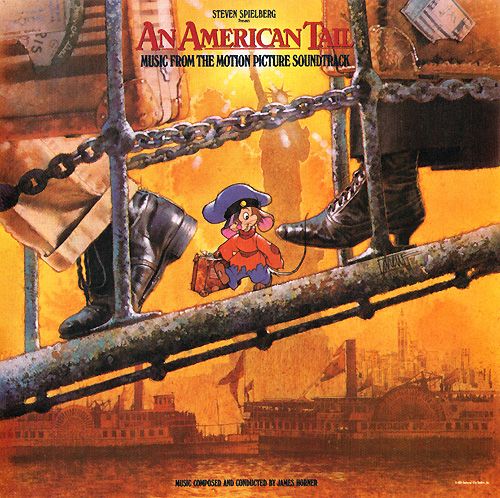
Music Composed and Conducted by
James Horner
Played by
The London Symphony Orchestra
Tracks:
1. Main Title (05:07)
2. The Cossack Cats (02:15)
3. There Are No Cats In America (03:00)
4. The Storm (03:59)
5. Give Me Your Tired, Your Poor (02:44)
6. Never Say Never (02:25)
7. The Market Place (03:02)
8. Somewhere Out There (02:40)
9. Somewhere Out There (03:59)
10. Releasing The Secret Weapon (03:38)
11. A Duo (02:38)
12. The Great Fire (02:54)
13. Reunited (04:44)
14. Flying Away And End Credits (05:59)
Total Time: 49'04
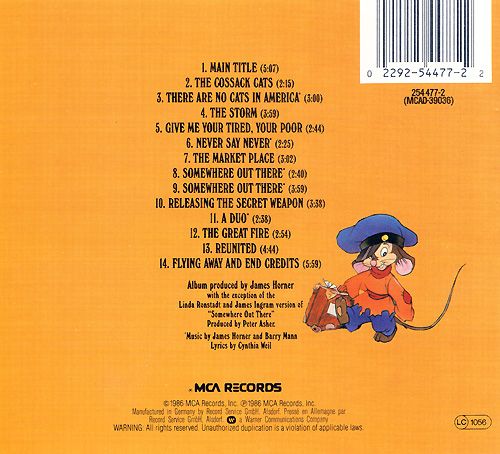
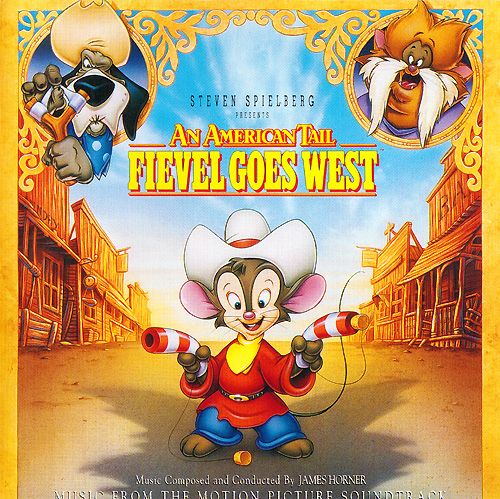
Music Composed and Conducted by
James Horner
Played by
The Hollywood Studio Orchestra
Tracks:
1. Dreams To Dream (Finale Version) (04:42)
2. American Tail Overture (Main Title) (07:09)
3. Cat Rumble (07:28)
4. Headin' Out West (01:47)
5. Way Out West (01:47)
6. Green River / Trek Through The Desert (05:43)
7. Dreams To Dream (Tanya's Version) (02:34)
8. Building A New Town (02:43)
9. Sacred Mountain (02:22)
10. Reminiscing (02:12)
11. The Girl You Left Behind (01:42)
12. In Training (01:49)
13. The Shoot-Out (05:29)
14. A New Land - The Future (08:16)
Total Time: 55'43
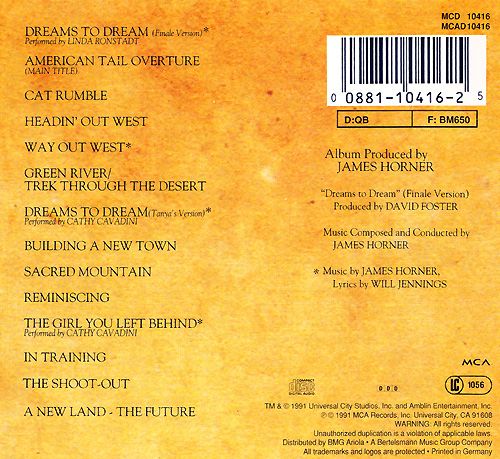
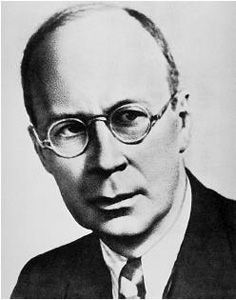
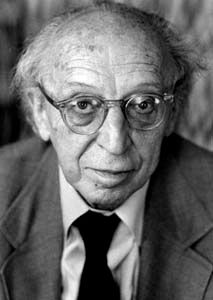
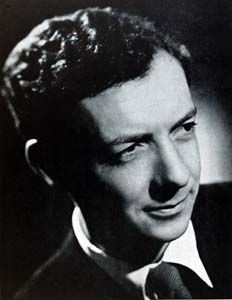
James Horner.
Sharing of these albums has ended. No more requests or re-ups, please.
And now for something completely mainstream:
An American Tail is a 1986 American animated adventure film directed by Don Bluth and
produced by Sullivan Bluth Studios and Amblin Entertainment.[1] The film tells the story of Fievel
Mousekewitz and his family as they immigrate from Russia to the United States for freedom.
However, Fievel gets lost and must find a way to reunite with his family. The film was released
on November 21, 1986.
Spielberg's original vision for the film was as a musical�it is said he wanted a "Heigh-Ho" of his own
(referring to the popular song from Disney's Snow White). The score for the film was composed by
James Horner, recorded in England, and performed by The London Symphony Orchestra and
the Choir of King's College. Horner is best known for his scoring of the films Titanic, Apollo 13,
Braveheart, Star Trek II: The Wrath of Kahn, and Aliens. Two excerpts of period music also appear
in the film, the John Phillip Sousa march Stars and Stripes Forever, and Poor Wand'ring One from the
1880 comic opera The Pirates of Penzance by Gilbert and Sullivan. There is also a musical reference
to the 1947 song Galway Bay popularized by Bing Crosby. Initially Bluth and his team were disappointed
with the first score recording, but once edited, they found the music worked quite well. Ironically, the
final score became one of the film's strongest points.
After the first round of songs were written, it was decided a special song would be written for Linda
Ronstadt (at that time the girlfriend of George Lucas) to sing over the end credits with James Ingram.
The song "Somewhere Out There", composed by Horner and written by Barry Mann, won a Grammy
Award and became one of the most popular songs from an animated feature since the 1950s.
An American Tail: Fievel Goes West is a 1991 American animated western film produced by
Steven Spielberg's Amblimation animation studio and released by Universal Pictures. It is the sequel
to An American Tail, and the last installment in the series to be released theatrically, also the fourth
installment in terms of the series' fictional chronology. It was later followed at the end of the 1990s
by another two direct-to-video midquels, both of which took place chronologically before this film. A
continuation of this installment, Fievel's American Tails, aired on CBS in 1992.
Don Bluth, the original film's director, had no involvement with this film. Instead, it was directed by
Phil Nibbelink and Simon Wells. Wells went on to do We're Back! A Dinosaur's Story, Balto, and The
Time Machine, while Nibbelink went on to co-direct We're Back! A Dinosaur's Story and direct his
own independent features.
The film follows the story of a family of Jewish-Russian mice who emigrate to the Wild West. In the
film, Fievel Mousekewitz is separated from his family (again) as the train approaches the American
Old West; the film chronicles Fievel and Sheriff Wylie Burp (voiced by James Stewart in his final film)
teaching Tiger how to act like a dog. The film performed modestly at the box office grossing $65
million and received mixed reviews from critics.
The soundtrack was composed by James Horner and includes Dreams to Dream, which was
nominated for a Golden Globe award. The song "Dreams to Dream" was based on a short instrumental
piece from An American Tail. The soundtrack quotes many classic western scores, from The Magnificent
Seven to Aaron Copland's Rodeo: Hoe Down. It also quotes several fiddle tunes including
The 8th Of January.

Music Composed and Conducted by
James Horner
Played by
The London Symphony Orchestra
Tracks:
1. Main Title (05:07)
2. The Cossack Cats (02:15)
3. There Are No Cats In America (03:00)
4. The Storm (03:59)
5. Give Me Your Tired, Your Poor (02:44)
6. Never Say Never (02:25)
7. The Market Place (03:02)
8. Somewhere Out There (02:40)
9. Somewhere Out There (03:59)
10. Releasing The Secret Weapon (03:38)
11. A Duo (02:38)
12. The Great Fire (02:54)
13. Reunited (04:44)
14. Flying Away And End Credits (05:59)
Total Time: 49'04


Music Composed and Conducted by
James Horner
Played by
The Hollywood Studio Orchestra
Tracks:
1. Dreams To Dream (Finale Version) (04:42)
2. American Tail Overture (Main Title) (07:09)
3. Cat Rumble (07:28)
4. Headin' Out West (01:47)
5. Way Out West (01:47)
6. Green River / Trek Through The Desert (05:43)
7. Dreams To Dream (Tanya's Version) (02:34)
8. Building A New Town (02:43)
9. Sacred Mountain (02:22)
10. Reminiscing (02:12)
11. The Girl You Left Behind (01:42)
12. In Training (01:49)
13. The Shoot-Out (05:29)
14. A New Land - The Future (08:16)
Total Time: 55'43




James Horner.
Sharing of these albums has ended. No more requests or re-ups, please.